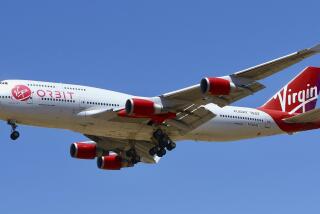Hughes, Martin Marietta Submit Their Final Bids for Ford’s Aerospace Unit
Hughes Aircraft and Martin Marietta have submitted final bids for the Ford Aerospace subsidiary of Ford Motor Co., defense industry sources said Tuesday.
The bid by Los Angeles-based Hughes Aircraft, a unit of General Motors, was submitted in conjunction with the French aerospace firm Alcatel, the sources said.
Alcatel reportedly is seeking to acquire Ford’s communications satellite business in Palo Alto and Hughes the remainder of the Newport Beach-based aerospace company.
When Ford put its defense unit on the market in early January, it was expected to fetch as much as $1.5 billion, but industry sources say it may go for as little as $600 million.
It is another measure of how depressed the defense industry has become, facing a future of spreading world peace and dwindling defense budgets.
“It’s fire-sale time in the defense industry,” one knowledgeable source said.
Ford Motor spokesmen Tom Rhoades declined to comment on what companies made bids or how much they were. He acknowledged only that Ford received bids. Rhoades said he did not know when a winner will be announced.
Elliot Miller, a spokesman for Bethesda, Md.-based Martin Marietta, said he could neither confirm nor deny the report that his company was a bidder. Martin, a major producer of spacecraft and electro-optical systems, was the nation’s eighth-largest defense contractor in 1989.
Hughes Aircraft spokesman Richard Dore also had no comment. General Motors Corp., which owns Hughes, was the nation’s fifth-largest defense contractor last year.
Ford Aerospace’s revenue is estimated at $2 billion annually, two-thirds of it from the defense sector. The company employs about 17,000 around the nation. Ford Motor was the nation’s 28th-largest defense contractor in 1989.
Ford Aerospace’s satellite business, which Alcatel wants to acquire, produces commercial communications satellites, including the most recent generation for the international communications agency Intelsat. In addition, the Palo Alto unit builds weather satellites for the Commerce Department’s National Oceanic and Atmospheric Administration.
A number of foreign firms have acquired U.S. defense contractors, with various arrangements to protect U.S. defense technology. Since Ford is not a major producer of military reconnaissance satellites, perhaps the most sensitive such technology, a purchase by a foreign company might not face insurmountable obstacles.
In addition to satellites, Ford Aerospace produces tactical missiles in Newport Beach, conducts support work for the National Aeronautics and Space Administration in Houston and operates a satellite tracking control center in Sunnyvale, Calif. Ford also owns BDM, a defense consulting and engineering organization, which was acquired in 1988 for $425 million.
Industry sources said Ford is a major contractor to the super-secret National Security Agency, operating telecommunications-intercept posts around the world.
A number of Ford operations would be good fits with Hughes Aircraft operations, including Ford’s tactical missile and electro-optical targeting businesses. Hughes is suffering a business downturn in both its electro-optical and missile businesses, and a consolidation with Ford could help both operations, experts said. But Hughes’ primary interest is in Ford’s software capabilities, the industry sources said.
The Ford satellite business would also seem to fit well with Hughes Aircraft’s Space & Communications group, the world’s dominant producer of communications satellites. But knowledgeable sources suggested that Hughes has little enthusiasm for Ford’s satellite operations.
Hughes’ decision to try to acquire Ford came as a surprise to some industry officials, who noted that Hughes has been attempting to diversify out of defense.
Hughes Chairman Malcolm Currie wants to obtain 40% to 50% of Hughes’ revenue from non-defense operations by the end of this decade.
More to Read
Inside the business of entertainment
The Wide Shot brings you news, analysis and insights on everything from streaming wars to production — and what it all means for the future.
You may occasionally receive promotional content from the Los Angeles Times.











